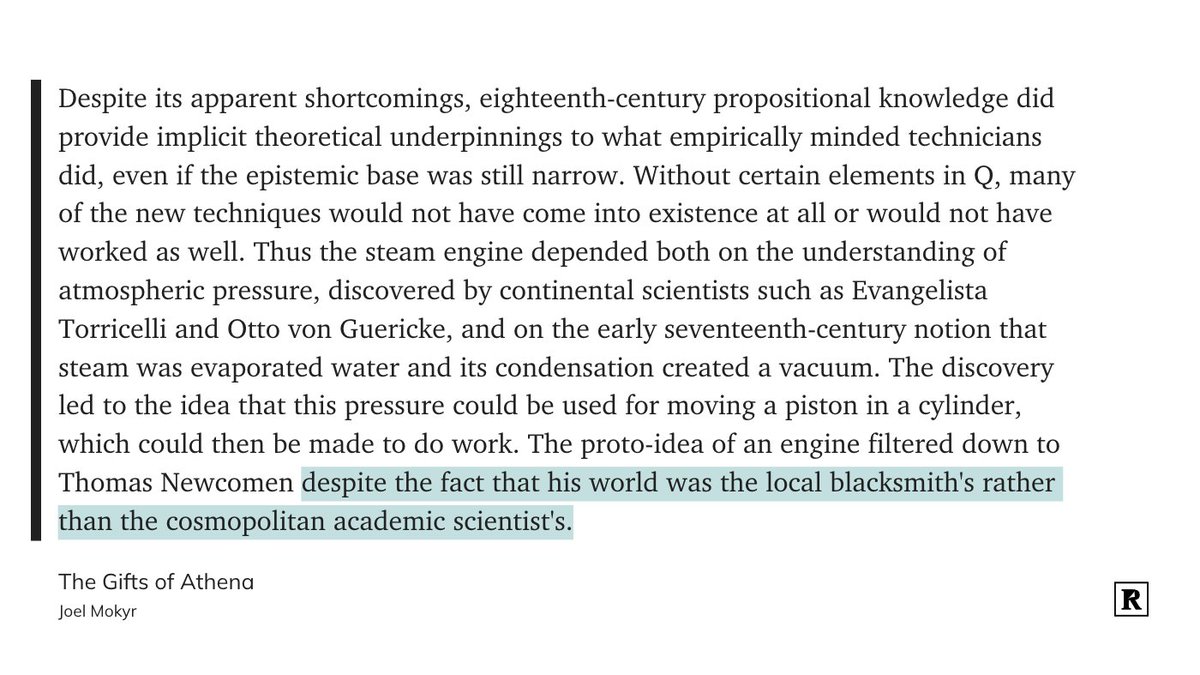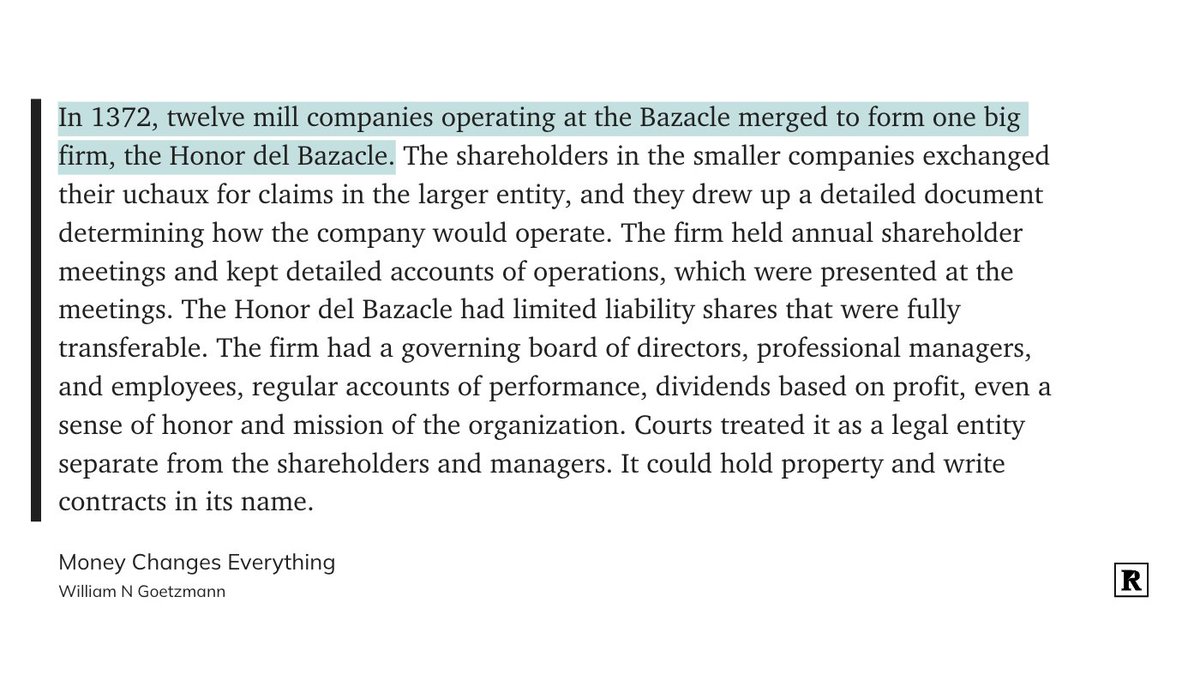“Thermodynamics owes more to the steam engine than the steam engine owes to thermodynamics.” True—but the steam engine owes a lot to the theory of air pressure and the properties of the vacuum: pic.twitter.com/IA9znp9oWi


True—but the steam engine owes a lot to the theory of air pressure and the properties of the vacuum.
Most people don't read → if you read books at all, you are more educated than most Even among those who read, most haven't read a book on X. If you read one book on X, you know more about it than the vast majority Read 2–3 books on one topic, and you're practically an expert twitter.com/Scholars_Stage…
More than 200 years before the Dutch East India Company, a set of mills in Toulouse, France formed one of the earliest corporations: pic.twitter.com/ZLNtPjqxtR

Someone asked me recently what's a boring topic that I'm excited/fascinated by. That's easy: cement. If it's wasn't thousands of years old, cement would seem futuristic. Think about it: it's *liquid rock*! Here's how it works:
Unshared knowledge is like potential energy. It’s nice to have, but it only changes things when you turn it into something else. Your legacy is what you share, not what you know. twitter.com/sean_a_mcclure…
Anytime you think your idea is unique, you just haven't read widely enough.
Knowledge is information. Wisdom is application.
Knowledge is the compound interest of curiosity.
Learning is the meat of failure. Self-doubt is the bones. Keep eating. Spit out the bones.
When access to all information is common, attention to important information is rare.
Creators do the work and let others grade the outcome. Consumers grade the outcome and let others do the work.
You can attract luck simply by sharing your work publicly.
A brief guide to success 1) Lots of research. Explore widely and see what is possible. 2) Lots of iterations. Focus on one thing, but do it in different ways. Refine your method. 3) Lots of repetitions. Stick with your method until it stops working. Research. Iterate. Repeat.
The teacher learns more than the student. The author learns more than the reader. The speaker learns more than the attendee. The way to learn is by doing.
What's the difference between knowledge and wisdom? I'll paraphrase educator John Holt: Knowledge is like knowing the names of all the streets in a city. Wisdom is knowing how to get from one place to another.
What's the cost of doing a poor job? What's the cost of doing a mediocre job? What's the cost of doing an exceptional job? Which price are you willing to pay?

The common narrative is that kids learn faster than adults, but I’m not sure the difference is meaningful. Watch any toddler. They spend nearly every waking minute on the edge of their ability and then sleep 12 hours. If adults acted similarly they would be learning machines.
When explaining fake news, ppl focus on the change in the "news" industry, but not our conception of what "fake" is: We used to think "truth" was external, & shared truth let us cohere. Now we believe truth is internal—& thus it's harder to coordinate b/c of conflicting truths.
I'm surprised more ppl w/ means don't get expert tutors to help them get up to speed on certain topics An expert has distilled many books & applied their own filter to it—you can get up to speed faster than just reading on your own Who here uses a tutor&where do you find them?
Strong Opinions, Weakly Held is more effective when you: - have fast & active feedback loops so you can calibrate accordingly. - are actively seeking out alternative explanations & hypotheses.
What’s the equivalent of quadratic funding but for speech? As a way of solving preference falsification—E.g. You have an opinion you want to share but only if enough people share it at the same time.
For the people who can talk to experts whenever they want, I’m curious how much value they get out of reading to learn a domain vs being tutored by or in regular dialogue with the experts directly (or what breakdown is most effective).
I want Wait But Why level explanations of how the world works but for everything. It could be a replica of Wikipedia product-wise, but with way better analysis.
Here's a meta thread of some of my favorite twitter threads, updated edition 👇
In school we learn to play the status game, the grades game, the compliance game... These games may help us “win” the game of school, but won’t get us far in real life. To succeed in life, whatever that means to us, we need to master a different game... The *METAGAME* 👇🏼🧵
The "school" I envision doesn't use games to teach kids. The school I envision *is* a game. From beginning to end.
Studies shows that when we go to sleep, our brain focuses on the most salient problem it was recently trying to solve. So if we want kids to retain what they “study" better, they should play video games first, then study before going to 💤 Reverse the order: First 🎮 then 📚

2.3 billion people play 🎮 games regularly. Those who understand the power and potential of games will be the ones who shape our future. 5 takeaways from a conversation between @shaneaparrish and @avantgame 👇🏼 podcasts.apple.com/us/podcast/101…

Schools frame "success" as a straight line. This sets kids up for disappointment and unrealistic expectations. Success in real life looks more like a squiggly line, with multiple ups and downs: Invent, launch, reinvent, relaunch. Start over. Repeat again and again. ➿ > ➖

Finding work that you enjoy is a shortcut to achieving your desired outcomes.





















